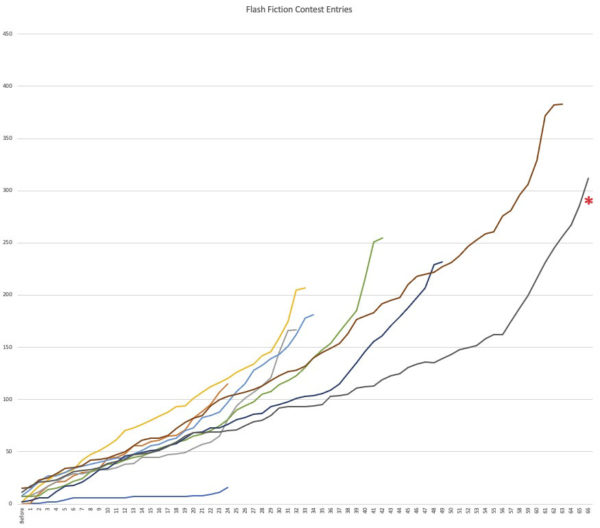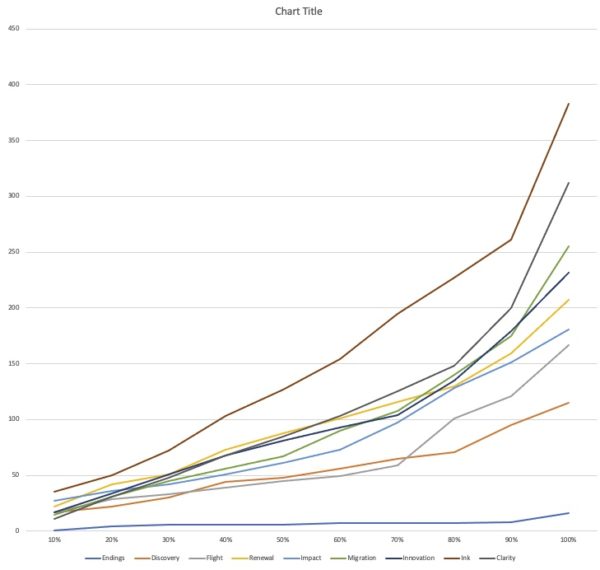
Nine years ago, Angel, Ben and I stuck our heads together to come up with an idea to bring some publicity to the Queer Sci Fi group and site. We hit upon a flash fiction contest, themed around a single word, and the annual QSF flash fiction contest was born.
The theme that first year was “Endings,” and we got a grand total of fifteen entries! We chose a winner, announced it with a bunch of fanfare, and moved on.
Now, nine years later, the contest has grown and grown. We had our largest year in 2021 with 384 submissions, but this year was no slouch either, with 312 300 word stories flooding in by the deadline.
Our themes to date include (in order):
- Endings
- Discovery
- Flight
- Renewal
- Impact
- Migration
- Innovation
- Ink
- Clarity
But how does it actually work?
Each year in late fall, we ask one of our admins (Me, Angel, Ryane, Ben) or Scott’s husband Mark to come up with a short list of themes, and then choose one of them as a group. This year’s theme “Clarity” was one of Ben’s – next year it’s my turn. I’m thinking Oreos. 😛 Then again, I might just be hungry.
Once we have the theme, we pre-announce it and start taking early submissions, though the official window opens on March 1st and closes May 1st. We used to give folks about a month to submit, but we’ve gradually extended the time year after year.
The winners from the previous year are invited to judge. This year we have one returning winner, Ava Kelly. We also recruited two other extremely generous authors – J.M. Dabney and Lexi Ander. Thanks to both for joining the team.
Once the submission window opens, I reach out to the sci-fi writers I know, one at a time, and invite them to be a part of this grand experiment. I post the contest on Duotrope and on call for submission pages on Facebook, and share it on the group and via the newsletter.
Then I read the stories as they come in, and add them to a master document, tagging each one with a number, cleaning up the formatting as needed, and logging it on my Entry Log spreadsheet along with some notes for my own benefit. And I send each one a release in case their story is chosen for the anthology.
And when do folks submit? They roll in pretty steadily for the first two thirds of the submission period, but then they pour in. This time, we received almost half of our entries in the last week or so, which makes for a crazy few days while I scramble to read and process all the stories that flow through my email (I flagged “Clarity’s” line with an asterisk in the chart)

While it looks like Clarity was a bit slower than previous years, that pretty much vanishes when I line all the years up by percentage of time (where they were 10% in, 20% in, 30% in, etc) – and yes, I am a bit of a data geek:

You can see from this one that Clarity was actually the second fastest to date.
Once the stories are all in, it’s time to prep the files for the judges. There’s this weird little Word bug that happens about 1% of the time, where the full story is visible in file preview, but a paragraph at the end is missing when I open the file, so every story has to be checked to make sure it’s all in the file.
Then I make a copy and remove the author names. I do the same with the entry log, creating a clean “scoring” sheet for the judges. And then both files are out of my hands.
The judges have about a month to read each story. They’re short, but over the years we’ve realized that when you read too many at once on the same theme, they all start to blend together, so it’s better to approach the task in small batches.
Judges consider four things for each story – spec fic content, LGBTQ+ representation, adherence to theme, and quality of the writing itself, and assign a score of 1-20 for each metric. They can also indicate if a story fails to meet one of these – and if three judges mark a story this way, it’s disqualified from advancing.
Once the judging round wraps up, the scores are sent back to me, and I create a master sheet and average all the judge scores.
So you’d think it would be done then, right?
Not quite.
We set a meeting date, and get together to discuss the stories. Generally the three winners come from the top ten stories, but judges have the option to advance for consideration a story that wasn’t at the top of the ranking.
Once we’ve settled on the stories in the running for the prize, a lively discussion ensues, and we then go through a few rounds of secret voting to choose the top three. Quite often, the story that scored highest is not the contest winner, but it usually places.
With that, we discharge the judges from their duty, only then revealing the identities of the contest winners to them.
We decided early on that judging blind was an essential part of the contest, to help remove any “friend bias” from the decision.
Then we send out notifications about who has been selected for the book and who hasn’t, and eventually name the honorable mentions (all stories over a certain score) and the top three winners, and publish the year’s anthology.
One more thing. I thought I’d share my non-scientific breakdown of the submissions. I say non-scientific because many of these are based on my own impression of the story, at least until we get the rest of the release forms in.
By genre:
- 119 Sci-Fi
- 101 Fantasy
- 59 Paranormal
- 42 Horror
By character identity:
- 98 Gay
- 98 Lesbian
- 95 Trans/Gender Fluid/Non-Ninary
- 36 Bi/Pan/Poly
- 23 Ace/Aro/Demi
- 3 Intersex
That’s about it. It takes a lot to run this thing every year, and it’s truly a labor of love for the five of us (and while the hubby Mark is not one of the judges, he cheers us on every year form the sidelines).
So as we close out this year’s contest, I raise my glass to all of our admins, our wonderful judges, and the 312 wonderful writers who took the time to write and submit something this year.
Cheers!
